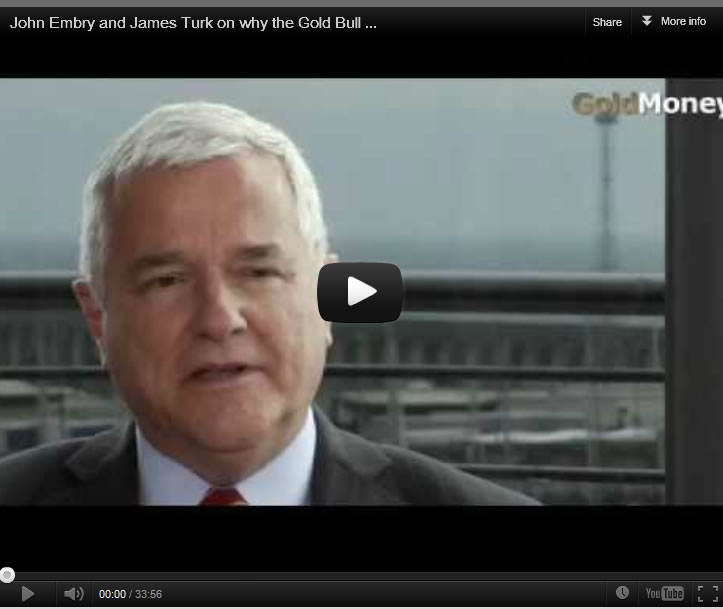John Embry and James Turk on why the Gold Bull Market isn't Over
Commodities / Gold and Silver 2012 May 21, 2012 - 08:35 AM GMTBy: Submissions
 Paul Buitink writes: This conversation between James Turk and John Embry was recorded on Friday 18 May.
Paul Buitink writes: This conversation between James Turk and John Embry was recorded on Friday 18 May.
They discuss recent volatility and panic in the gold and silver markets. According to John Embry markets are now highly oversold. He mentions the “leap day slaughter” and the counterintuitive situation in which gold and silver prices went down on the backdrop of negative economic news and money printing. Natural selling followed forced selling.
Embry thinks the bottom is being tested right now and that there’s a lot of upward potential with limited risk. He notes that if you’re negative on gold, you must be bullish on currencies, which doesn’t make sense in the current environment.
James notes the media’s negative sentiment towards gold lately, which has scared people away from the metals. He also notes that the banking system is falling apart in Europe, which should boost gold’s status as a safe haven asset.
John thinks that the “risk on/risk off” concept is wrong and dislikes how pundits sell you the idea that gold is in the “risk on” category. Who wants to own US treasuries considering the US deficit and inflation?
People should accumulate and buy gold considering the bull market gold is still in.
The performance of gold shares has been even more counter-intuitive.
John sees the gold price surging to new heights in the not-too-distant future, which could even lead to a dramatic rise in gold stocks. The shares began a bear market in 1997 when the mining company Bre-X collapsed.
John sees a massive stampede out of paper currencies into gold before the bull market ends. In particular the flight from paper gold to physical gold could have an enormous impact on the market.
Both men agree that hyperinflation is inevitable. John agrees with Jim Sinclair’s contention that we’ll face QE to infinity notwithstanding current low velocity in money.
Mario Draghi or Ben Bernanke; who will be the world champion of money printing?
James notes that Keynesianism doesn’t work in US, Europe or China and all governments are overleveraged as a result. Also the banking system is in the same dire straits around the globe.
When people tell John to sell gold and silver he asks them what he can buy. He doesn’t see viable alternatives.
James stresses the importance of buying gold and silver and the concept of dollar cost averaging. We have a long way to go before the gold bull market reaches its end. By that time you won’t sell gold, but rather exchange it for other productive assets.
John is amazed at how people are influenced psychologically and sell when prices go down while they should buy.
They discuss how Greece is in a great depression. The fear of contagion with risk is still huge. Spain is just a bigger Greece.
Gold will return to the forefront of the monetary system, which will be difficult for politicians to accept.
Outstanding derivatives amount to 10-20 times of GDP.
It’s 2008 all over again and John doesn’t expect that big institutions will be allowed to fail. If John were Emperor he would follow Von Mises’s advice and let the debt collapse because hyperinflation would just make the problem worse.
With regards to Greece, John notes that creditor nations shouldn’t have extended so much debt to debtor nations in the first place and as a result he expects revolutions.
Gold functions as the metaphorical canary in the coalmine, therefore positive price action is unpalatable to many special interest groups. In spite of recent volatility gold is still in a robust bull market.
If the gold price were to rise 100-150 dollars in one day then John would take that as a sign that interference in the market has stopped.
Both men firmly believe that gold shares have reached the end of their bear market. A good sign this was seen on Thursday 17 May when solid price action in mining shares accompanied a general decline in global stock indices.
Paul Buitink
© 2012 Copyright Gold Money - All Rights Reserved
Disclaimer: The above is a matter of opinion provided for general information purposes only and is not intended as investment advice. Information and analysis above are derived from sources and utilising methods believed to be reliable, but we cannot accept responsibility for any losses you may incur as a result of this analysis. Individuals should consult with their personal financial advisors.
© 2005-2022 http://www.MarketOracle.co.uk - The Market Oracle is a FREE Daily Financial Markets Analysis & Forecasting online publication.




